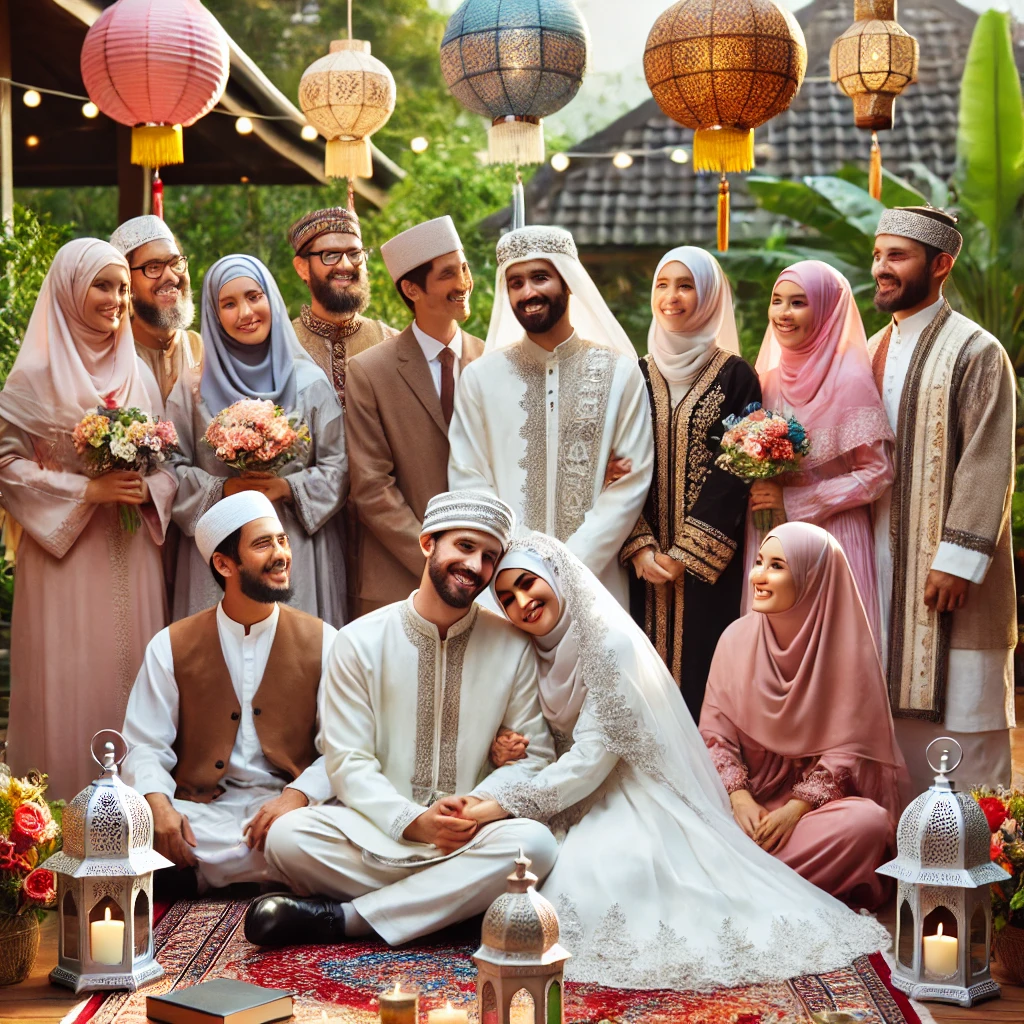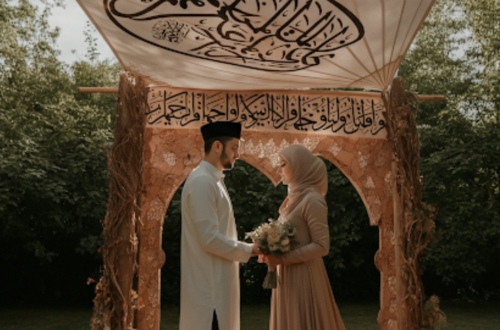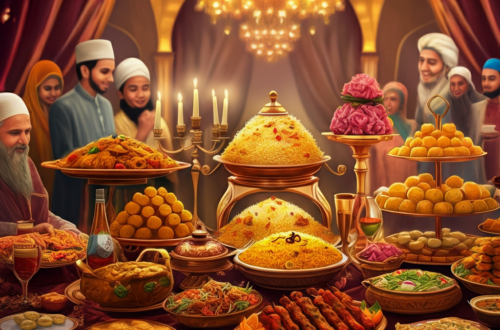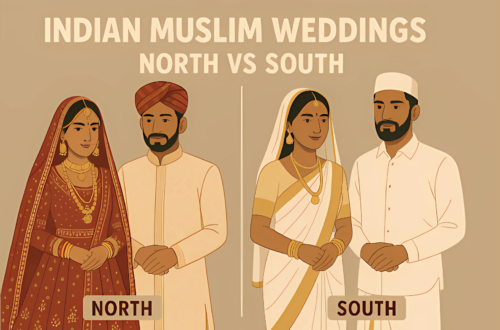Intercultural marriages are increasingly common in the modern Muslim community, reflecting the global and diverse nature of the ummah. While Islam encourages unity and mutual respect regardless of cultural backgrounds, the journey to an intercultural marriage often involves navigating family dynamics and expectations. Misunderstandings can arise due to cultural differences, and families may struggle to reconcile traditions with the universal principles of Islam. This blog explores the Islamic perspective on intercultural marriages, discusses the role of family, and offers practical guidance for building strong, harmonious relationships.
Join India’s leading Muslim Matrimonial platform, salaamsoulmate.com, and connect with your perfect match today!
Intercultural Marriages in Islam: A Universal Principle
Islam is a universal religion that transcends ethnicity, nationality, and cultural boundaries. The Qur’an emphasizes the equality of all human beings and encourages Muslims to focus on piety and character rather than racial or cultural differences when choosing a spouse:
“O mankind, We have created you from a male and a female and made you peoples and tribes that you may know one another. Indeed, the most noble of you in the sight of Allah is the most righteous of you.” (Qur’an 49:13)
Intercultural marriages are a reflection of this divine principle, showcasing the richness of diversity within the global Muslim community. By focusing on shared faith and values, these marriages can strengthen bonds between different cultures and promote unity.
Key Challenges in Intercultural Marriages
1. Balancing Cultural Differences
One of the primary challenges in intercultural marriages is balancing cultural traditions. Each partner brings unique customs, languages, and practices that may differ significantly from the other’s. Misunderstandings can occur when one partner feels pressured to abandon their cultural identity or conform to the other’s traditions.
2. Family Expectations and Approval
Families often play a significant role in Muslim marriages, and their approval is highly valued. However, when a prospective spouse comes from a different cultural background, families may hesitate due to unfamiliarity or concerns about preserving their cultural identity.
3. Miscommunication and Stereotypes
Cultural stereotypes and assumptions can create barriers in intercultural marriages. For example, one family may mistakenly perceive the other culture as incompatible with their values, leading to unnecessary conflicts or resistance.
Islamic Guidelines.
Islam provides clear guidance to help Muslims navigate the complexities of intercultural marriages.
1. Prioritizing Faith and Character
When choosing a spouse, Islam emphasizes the importance of piety and good character above all else:
“A woman is married for four things: her wealth, her lineage, her beauty, and her piety. Choose the pious one, and you will prosper.” (Sahih al-Bukhari)
This principle applies equally to men and women. Cultural background, while important, should not overshadow the core values of faith, respect, and compatibility.
2. Mutual Consent and Communication
Both partners must give free and informed consent to the marriage, and open communication is essential to ensure a shared understanding of expectations and responsibilities.
3. Upholding Justice and Fairness
Intercultural marriages require sensitivity to both cultures. Islam encourages fairness and mutual respect, ensuring that neither partner feels marginalized.
Role of Families
Family involvement can greatly influence the success of an intercultural marriage. While families often want the best for their loved ones, it is essential to distinguish between genuine concerns and cultural biases.
1. Addressing Concerns Respectfully
Families may have legitimate concerns, such as differences in language, lifestyle, or future plans for children. Couples should address these concerns respectfully and seek solutions that align with Islamic principles.
2. Educating Families About Islam’s Stance
Educating family members about the Islamic perspective on intercultural marriages can help dispel misconceptions. Highlighting the Prophet Muhammad’s (peace be upon him) inclusive approach to marriage can be particularly impactful. For instance, his companion Bilal ibn Rabah (may Allah be pleased with him), an Ethiopian, married within the Arab community, demonstrating the acceptance of intercultural unions.
3. Building Relationships Through Understanding
Taking the time to understand and appreciate each other’s families can foster trust and acceptance. Sharing cultural traditions, foods, and stories can help bridge gaps and create common ground.
Practical Tips for Navigation.
1. Foster Open Communication
Openly discuss your expectations, goals, and cultural traditions with your partner. Address potential conflicts early and find compromises that honor both cultures.
2. Seek Knowledge Together
Learn about each other’s cultural backgrounds and practices. This knowledge can help you approach differences with empathy and avoid misunderstandings.
3. Establish Common Values
Identify shared values that transcend cultural differences, such as mutual respect, family support, and a commitment to Islamic principles. These common values can serve as a foundation for your marriage.
4. Involve Trusted Mediators
If families are resistant to the marriage, involve knowledgeable and respected individuals, such as scholars or community leaders, to mediate and provide guidance.
5. Celebrate Cultural Diversity
View your differences as a source of strength rather than division. Celebrate the richness of both cultures in your daily lives and special occasions.
Benefits of Intercultural Marriages in Islam
Intercultural marriages can bring numerous benefits, both for the couple and the broader community.
1. Enriching Perspectives
Couples gain a deeper understanding of different traditions, broadening their perspectives and fostering personal growth.
2. Strengthening the Ummah
By uniting individuals from diverse backgrounds, intercultural marriages embody the inclusivity of Islam and strengthen the global Muslim community.
3. Passing Down Shared Values
Intercultural couples have the unique opportunity to instill values of unity, respect, and diversity in their children, preparing them to thrive in an increasingly interconnected world.
Addressing Common Misconceptions.
1. They Are More Prone to Failure
While cultural differences can pose challenges, the success of any marriage depends on the couple’s commitment, communication, and shared values—not their cultural backgrounds.
2. Children Will Struggle With Identity
Children of intercultural marriages often benefit from exposure to multiple cultures, gaining a rich and nuanced sense of identity. Parents can guide them by emphasizing Islamic values as a unifying foundation.
3. Cultural Differences Lead to Constant Conflict
With mutual respect and open communication, cultural differences can become a source of learning and enrichment rather than conflict.
Read more on Islam vs culture.
Conclusion: Embracing the Beauty of Intercultural Marriages
Intercultural marriages in Islam exemplify the universality of the faith and its capacity to unite people across diverse backgrounds. While family involvement and cultural differences can present challenges, they also provide opportunities for growth, understanding, and the celebration of diversity.
By adhering to Islamic principles, prioritizing piety and character, and fostering open communication, couples can build strong, harmonious relationships that honor both their faith and their cultural heritage. Families, too, play a vital role in supporting and nurturing these unions, ensuring that love and respect remain at the heart of the marriage.
Intercultural marriages are a testament to Islam’s timeless message of unity, inclusivity, and mutual respect. By navigating cultural differences with wisdom and empathy, couples can create lasting partnerships that inspire others and strengthen the bonds of the ummah.






